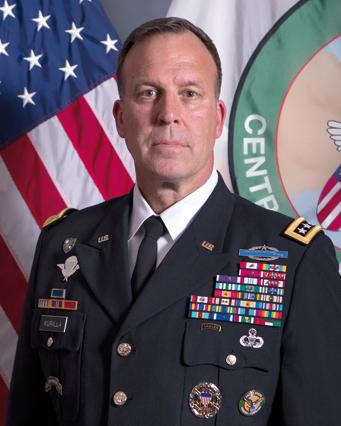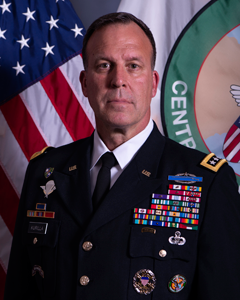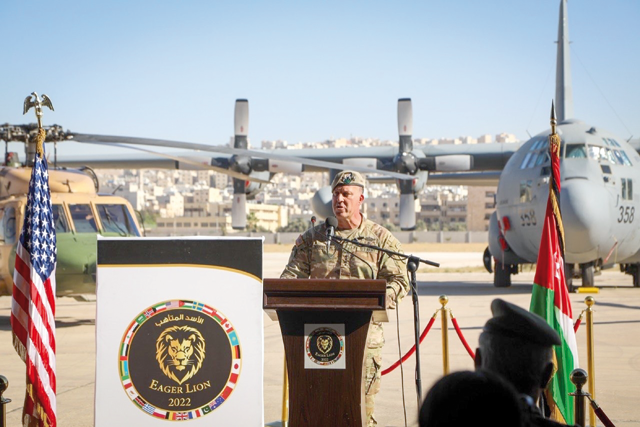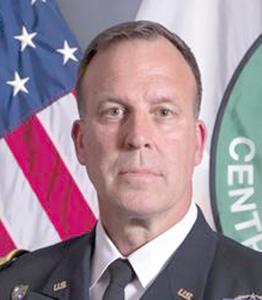You are here
Int’l effort key in containing Iran — CENTCOM commander
By Mohammad Ghazal - Aug 21,2022 - Last updated at Aug 21,2022

General Michael 'Erik' Kurilla
- Jordan one of CENTCOM’s ‘strongest, most committed, and most reliable partners’
- Kingdom to host ‘Eager Lion’ military exercise in September
- Al Hol camp ‘a ticking time bomb, representing a possible ISIS 2.0’, says General Kurilla
AMMAN — An international effort and a whole-of-government approach that is inclusive of diplomatic engagement is required to contain Iran, which is the primary destabilising element in the Middle East, according to Commander of US Central Command (CENTCOM) General Michael “Erik” Kurilla.
The US, Jordan, and militaries within the Middle East certainly have a shared interest in countering Iran’s proliferation of advanced conventional weapons and its support to proxies as Iran’s rapidly expanding military capabilities enable it to coerce its neighbours, threaten international trade, and exploit instability throughout the region, he said.
“Iran remains an enduring threat in the CENTCOM area of operations due to its use of its increasingly sophisticated military capabilities, broad proxy network, and periodic willingness to use force against our allies and partner forces,” he said during a press conference via email this week.
“We must continue to build interoperability with allies and partners to deter and, when required, defeat Iranian conventional military capability across multiple domains. That’s why the kinds of partnerships we are building are so critical. That’s why we at CENTCOM focus so intensely on partnerships,” he added.
Tehran’s primary power projection tools are ballistic missiles, drones, and expanding maritime capabilities. Furthermore, Iran demonstrates a willingness to share advanced conventional weapons with Shiite militant proxies and partners throughout the region, he said. The commander stressed the need for continued investment in technology, including Artificial Intelligence and machine learning platforms and programmes, to increase CENTCOM’s and its allies’ ability to detect, defend, and respond to conventional Iranian military capabilities.
The general said that the US CENTCOM remains concerned about Al Qaeda, Daesh, and other terror groups and will continue to target Al Qaeda leaders and leaders of Al Qaeda affiliates, as evidenced by a US strike in Idlib province, Syria, on June 27 that killed Abu Hamzah Al Yemeni, a senior leader of Hurras Al Din, an Al Qaeda-aligned terrorist organisation.
‘Jordan: One of CENTCOM’s strongest partners’
Stressing the “solid” partnership with Jordan and its pivotal role in the region, the commander said: “Jordan is one of CENTCOM’s strongest, most committed, and most reliable partners. Jordan has long led the way for security and stability in the region.”
“The strategic importance of the Jordanian Armed Forces was made clear during the battle against Daesh. Under the leadership of His Majesty King Abdullah II, the Jordanian Armed Forces continues to serve as a reliable strategic partner and a bulwark for regional peace and stability,” he said during the press conference.
The US CENTCOM commander said last week he met with Chairman of the Joint Chiefs of Staff of the Jordanian Armed Forces Major General Yousef Al Huneiti in Amman and discussed many matters of importance to both of “our nations and sought ways to improve our partnership”.
“I have a great relationship with General Huneiti. This is a relationship built on trust. This is to the benefit of the region. We will lean on this relationship in the months to come,” he said.
‘Jordan to host Eager Lion’
Approximately 1,900 US service members, 2,300 Jordanian Armed Forces personnel, and 800 coalition personnel from a total of 30 partner nations are participating in or observing the multilateral military training exercise “Eager Lion” from September 4 to 15 in Jordan, he said.
Jordan is the host nation for exercise Eager Lion, with the upcoming exercise being the 10th iteration of an event that’s considered the capstone training event of the broader US military relationship with the Jordanian Armed Forces, he said.
“Participating in Eager Lion delivers a clear message: Relationships matter. Integrating processes, systems, and command and control functions strengthens relationships and trust, which cannot be established in times of crisis,” the US CENTCOM general added.
Military operations outside of the area do not affect the exercise, he said, adding that that the full effect of the war in Ukraine on Middle East security has yet to be seen.
“We know the impact to date has been significant. Food insecurity — led by wheat shortages — and the dramatic rise of food prices in the region are weighing on the overall security situation. The sharp rise in inflation is another factor. Across the region, inflation has shot up — in some countries up to 30 per cent — since before Russia’s illegal invasion of Ukraine,” he said.
“We’re seeing staggeringly high fuel prices across the region, resulting in rolling blackouts to save costs in this oppressive summer heat. Fuel shortages also limit some of our partnered militaries’ ability to patrol their borders in air and on land. So, tragically, the impact to the general security in the Middle East has been significant,” the general said.
‘Al Hol camp: A ticking time bomb’
Further elaborating on regional security, the general said that Al Hol camp, in northeastern Syria, represents a real threat to the region and a humanitarian catastrophe, highlighting that the situation is “dire”.
“With approximately 56,000 residents — more than 90 per cent of them women and children — living in tents in dangerous heat with squalid conditions, the camp is a laboratory of human suffering. It is also a ticking time bomb, representing a possible ISIS 2.0,” he said.
“With approximately 80 births in the camp each month, Al Hol is a literal breeding ground for the next generation of ISIS. Approximately 70 per cent of the population is under the age of 12. These young people are subject to radicalisation, given their quality of life,” he said.
Most of the camp’s residents are Syrians and Iraqis, some of whom maintain links with Daesh. About 10,000 of them are foreigners, including relatives of Daesh fighters, he said. Observers are increasingly worried of what was meant to be a temporary detention facility turning into a extremist breeding ground at the hands of Daesh, the general added. Most of Al Hol’s residents are people who fled or surrendered during the dying days of Daesh’s self-proclaimed “caliphate” in early 2019, according to Agence France-Presse.
There is no military solution to the threat posed by the Al Hol camp, he stressed.
“The most durable solution is for countries of origin to repatriate, rehabilitate, and reintegrate their citizens. Approximately half of the residents at Al Hol are originally from Iraq. Should Iraq repatriate, rehabilitate, and reintegrate their residents, the problem would immediately become much more manageable,” he indicated.
The commander said that it was of paramount importance to properly tackle the issue of Al Hol camp before the situation escalates.
“These are people — women and children. They can be returned to society. They can be productive. We need a safe, voluntary, dignified return to countries of origin…We are going to confront this now or confront it later. We don’t want to exercise that second option,” he added.
Families in Al Hol continued to voluntarily return and reintegrate into their communities of origin within Syria, but there is a need to speed up the process, he said.
“If repatriations continue at the current pace, it will take 20 years before all the children stuck in the camp can get out. This pace must increase if we want the children stuck in the camps to have a normal and productive life. We need a safe, voluntary, and dignified return to their country of origin for these people,” he said.
Related Articles
AMMAN — Northeastern Syria’s Al Hol camp, populated by over 51,000 residents, 90 per cent of whom are women and children, has become “a flashpoint of human suffering”, said head of US Central Command (CENTCOM) General Michael Kurilla.
AMMAN — Countries need to step up and do their job by identifying their citizens in order to repatriate, rehabilitate and re-ingrate t
AMMAN — United States Central Command (CENTCOM) Commander General Michael Kurilla has described Jordan as a “reliable strategic partner and














